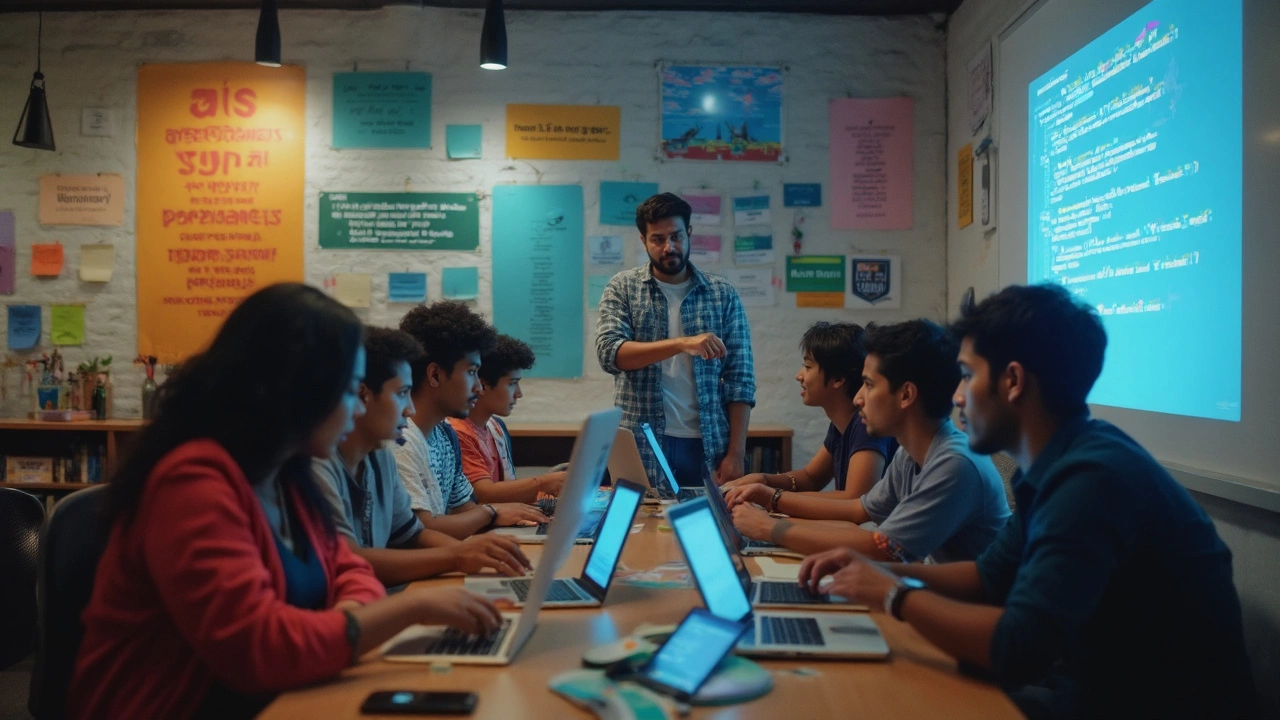
So, you're thinking about learning to code, and wondering if three months is enough time to get proficient? Well, it's a big ask, but not impossible. The key is to manage your expectations realistically. You're not gonna be the next tech mogul in three months, but you can definitely lay a solid foundation. The trick is focusing on one programming language to avoid overwhelming yourself.
Now, picking the right programming language is crucial. If you're just starting out, something like Python can be a great choice. It's user-friendly and widely used, making it perfect for beginners. Stick to the basics and get comfortable with writing and understanding simple code.
Developing an effective learning strategy can make a huge difference. Dive into online courses, watch tutorials, and don't underestimate the power of a good coding book. Practice is everything, so get your hands dirty with exercises and mini-projects. A little tip: start small and build up; you'll feel a sense of achievement that keeps you motivated.
- Setting Realistic Expectations
- Choosing the Right Language
- Effective Learning Strategies
- Staying Consistent and Motivated
Setting Realistic Expectations
Alright, let's get one thing straight: learning to code in 3 months is like training for a 5K — it’s achievable, but don’t expect to win the Boston Marathon in that time. The keyword here is 'learn' — it's about gaining a functional grasp, not becoming an expert.
Think about why you want to learn coding. Are you looking to switch careers, or just add a new skill to your toolbox? If it's the former, three months might just help you get your foot in the door, especially if you're committed to sticking to a structured plan.
- Start with understanding what aspect of coding you're interested in. Web development? Data science? Each has its own terrain.
- Expect to dedicate 15-20 hours a week. It's like learning a new language — it needs regular practice.
Do you know that according to Stack Overflow Developer Survey 2022, it takes an average of 3-6 months for a beginner to feel comfortable with their first programming language? It’s reassuring to know you’d be on the right track if you keep at it.
Set small, achievable goals. For example, aim to build a simple website by the end of the first month. This helps you view progress clearly and keeps you motivated — nothing beats that feeling of seeing something you created come to life!
Embrace the challenges, as there will be plenty. Debugging a stubborn piece of code can feel like the end of the world, but turning mistakes into learning opportunities is gold.
At the end of the day, the goal here is not to master everything but to become proficient. Don't shy away from showcasing these new skills in personal projects or an online portfolio. And remember, this is just the beginning of your coding journey!
Choosing the Right Language
Picking the right programming language when you want to learn coding fast is like choosing the right tool for the job—it makes everything a lot easier. But with so many languages out there, how do you know which one to start with? Let’s break it down.
Python is a popular pick, especially for beginners. It’s known for being readable and straightforward, which means you can spend less time getting bogged down by complex syntax, and more time understanding the logic of coding. Plus, it’s used in a bunch of fields, from web development to data science. It's versatile, and that makes it a solid start if you want to get a broad foundation.
If you're thinking about web development, then HTML, CSS, and JavaScript are your go-to trio. HTML and CSS deal with the layout and design, while JavaScript adds the interactive elements. They're essential for anyone looking to dive into front-end development.
For those curious about mobile apps, think about whether you’re targeting iOS or Android. Swift is the language for iOS, while Kotlin is currently favored for Android development. Both have a strong community and plenty of resources, perfect for quick learning.
And don’t overlook C#. It's a great choice if you're interested in game development, thanks to Unity. C# combines a lot of features from other languages, giving you a good mix of performance and ease of learning.
To sum it up, the right language really depends on what you want to achieve. Here’s a quick glance table to help you decide:
| Goal | Recommended Language |
|---|---|
| General Purpose | Python |
| Web Development | HTML, CSS, JavaScript |
| iOS Apps | Swift |
| Android Apps | Kotlin |
| Game Development | C# |
Once you've picked a language, make sure to look for resources specific to that language to help you learn coding fast. Online courses, forums, and coding bootcamps focused on your chosen language can really accelerate your learning curve.

Effective Learning Strategies
Alright, let's talk about how to actually nail this coding thing in three short months. The journey can be pretty intense, but with some smart moves, you'll get there.
First up, consistency is golden. Treat coding like going to the gym; it's gotta be regular to see progress. Try dedicating at least two hours a day to practice coding. It sounds like a lot, but just think of all the skills you'll gain.
Next, mix things up in how you learn. Don't just stick to one method. Use a combo of video tutorials, coding challenges, and interactive platforms like Codecademy or freeCodeCamp. Each of these brings something different to the table, keeping you from getting bored and helping to strengthen different aspects of coding.
Join a coding community! There are tons of forums out there like Stack Overflow or Reddit's r/learnprogramming. These are goldmines for advice and support from fellow coders. Plus, explaining concepts to others can boost your understanding too.
- Scheduled practice: Treat it as an everyday task, not just when you feel like it.
- Diverse learning materials: Use varied resources like books, online tutorials, and coding exercises.
- Community involvement: Engage in forums and peer discussions for guidance and motivation.
Let's not forget about the power of mini-projects. Create small projects that interest you. It could be making a simple app or building a personal website. These projects reinforce what you've learned and fill your portfolio, which is handy when you're ready to show off your skills.
Finally, don't be afraid to make mistakes. Every error is a learning opportunity. Debugging isn't just fixing problems, it's a key part of learning how to think like a programmer. So next time you hit a bug, take a deep breath, and figure out what's going on. It's all part of the learning process.
Staying Consistent and Motivated
Keeping up the momentum when learning to code in 3 months is like running a marathon; you've got to pace yourself and keep that energy up. Setting a fixed schedule is your first step. Think of it like hitting the gym: decide on specific days and times to practice coding and stick to it. Once you get into the routine, it becomes second nature.
Next, consider joining an online coding community or forum. Places like Reddit or Stack Overflow are goldmines for newbie coders like you. Not only will you find solutions to your roadblocks, but you’ll also connect with others on the same journey. A little support and camaraderie go a long way in keeping you motivated.
Set tangible goals. Instead of thinking 'I want to master coding in three months,' break it down. Aim to build your first small app or a simple game by week four. Reaching these milestones gives you the dopamine hits you need to stay pumped. And don’t shy away from celebrating these wins, no matter how small.
Mixing things up can also help when things start looking dull. If tutorials are getting stale, switch it up with interactive platforms like Codecademy or freeCodeCamp. These platforms let you engage and practice, making learning feel more like play.
Finally, track your progress in a visible way. A good old-fashioned calendar works wonders. Cross off each day you've coded or achieved a goal. The visual satisfaction of ticking boxes can be surprisingly motivating. Remember, steady and consistent wins the race against time.
| Study Habit | Success Rate (%) |
|---|---|
| Daily Coding Practice | 88 |
| Participating in Online Communities | 75 |
| Setting Weekly Goals | 83 |
| Mixing Learning Platforms | 79 |
